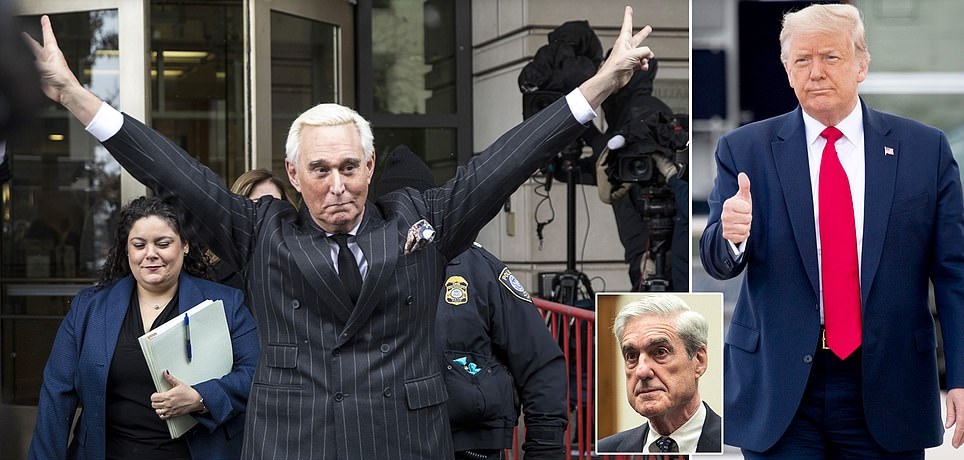It is hard to imagine a more corrupt use of the clemency power than President Trump’s commutation of the sentence of convicted felon Roger Stone.
The Stone action has been so repeatedly telegraphed by Trump, and Trump’s broader misuse of the pardon power so blatant, that it is easy to lose sight of this ugly reality.
Stone, in fact, said the corrupt part out loud, in a conversation with NBC’s Howard Fineman shortly before Trump’s announcement.
“He knows I was under enormous pressure to turn on him,” Stone told Fineman. “It would have eased my situation considerably. But I didn’t.”
But Stone epitomizes the danger the Framers had in mind when they debated the pardon power.
George Mason warned at Virginia’s ratifying convention in 1788 that the president “ought not to have the power of pardoning, because he may frequently pardon crimes which were advised by himself.”
James Madison’s reply was, in retrospect, heartbreakingly naive. “There is one security in this case,” he observed. “If the President be connected, in any suspicious manner, with any person, and there be grounds to believe he will shelter him, the House of Representatives can impeach him.”
Stone was convicted of obstructing Congress, of perjury, of witness tampering — seven felony counts, all involving efforts to cover up his dealings with WikiLeaks and the Trump campaign, including Trump himself, about his efforts to obtain information about Democratic emails hacked by Russians seeking to help Trump win the 2016 election.
If Trump did not, as Mason feared, advise Stone’s crimes, he benefited from them.
U.S. District Judge Amy Berman Jackson, sentencing Stone to 40 months in prison, made that clear.
“He was not prosecuted, as some have complained, for standing up for the president,” she said. “He was prosecuted for covering up for the president.”
Indeed. Trump, in the White House announcement of his action, dismisses these as “process-based charges leveled at high-profile people in an attempt to manufacture the false impression of criminality lurking below the surface.”
No surprise that this president does not consider lying or obstructing justice serious crimes; they are second nature to him.
But without the capacity and will to prosecute such offenses, the scaffolding of the rule of law collapses.
In sentencing Stone, Jackson made clear the gravity of his offense.
“The truth still exists,” she said. “The truth still matters. Roger Stone’s insistence that it doesn’t, his belligerence, his pride in his own lies are a threat to our most fundamental institutions, to the very foundation of our democracy.”
As is Trump’s action in belittling the seriousness of Stone’s offense.
The White House statement smeared not only the prosecutors working for former special counsel Robert S. Mueller III, but, by implication, all their colleagues at the Justice Department:
“These charges were the product of recklessness borne of frustration and malice. This is why the out-of-control Mueller prosecutors, desperate for splashy headlines to compensate for a failed investigation, set their sights on Mr. Stone.”
Maybe the president should check in with his own Justice Department — indeed, with his own attorney general.
Stone “committed serious offenses and deserves a sentence of incarceration that is sufficient, but not greater than necessary,” the Justice Department wrote in its second, revised sentencing memorandum in the Stone case.
And just a few days ago, Attorney General William P. Barr told ABC’s Pierre Thomas, “I think the prosecution was righteous, and I think the sentence that the judge ultimately gave was fair.”
Perhaps the most striking thing about the Stone commutation is that it is not out of the ordinary for Trump — it is part of a deviant pattern from this president.
As Harvard Law School professor Jack Goldsmith observed, Trump has issued a record-low number of pardons and commutations for the modern presidency, a remarkably high percentage of which were granted to a personal or political associate — 31 of 36 by the count of Goldsmith and Lawfare intern Matt Gluck.
“No president in American history,” they write, “comes close to matching Trump’s systematically self-serving use of the pardon power.”
Systematically self-serving.
That is the essence of the Trump presidency.
Even this far into it, we have to summon the outrage to say so.
